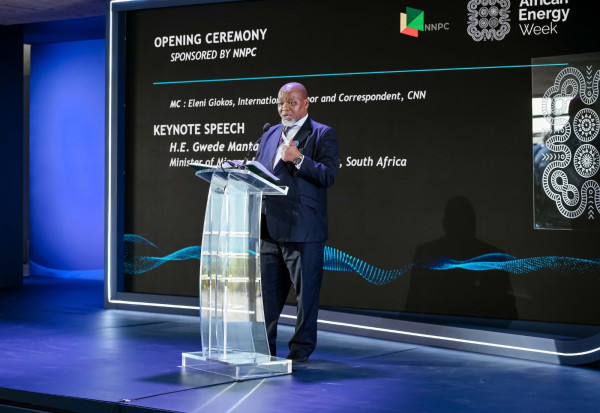Representing Africa’s most industrialized nation, South Africa has a strategic development plan in place centered on an integrated and diversified energy industry. While faced with an energy crisis, the country has prioritized regulatory reforms under efforts to attract new investment into the entire energy value chain, thereby stimulating power generation and heavy-fuel expansion. Policies such as the Renewable Energy Independent Power Producer Program (REIPPP) and the Integrated Resource Plan (IRP) serve as catalysts for growth, and during this year’s African Energy Week (AEW) Conference&Exhibition – scheduled for October 16-20 in Cape Town – South Africa’s Minister of Mineral Resources and Energy Gwede Mantashe will provide further insight into the country’s just energy transition approach.
Mantashe is set to deliver an opening keynote address at the conference, joining a strong slate of regional energy ministers alongside Namibian President Hage Geingob and Senegalese President Macky Sall to discuss the future of Africa’s energy sector.
Under Minister Mantashe’s leadership, the Department of Mineral Resources and Energy (DMRE) has made great strides towards opening up the South African energy market. With energy security top of the agenda, the Ministry has been making a big play for investment, engaging with a suite of foreign investors and energy firms to advance both offshore and onshore exploration, the development of large-scale renewable energy systems and the adoption of new technologies.
While development has been slow, milestones reached by foreign and regional energy companies have set the country apart as one of the most promising plays for hydrocarbon investment. Two major gas discoveries made in 2019 and 2020 – the Brulpadda and Luiperd discoveries – identified nearly 1 billion barrels of gas condensate each. Neighboring success in the Namibian side of the Orange Basin – with five major finds made since 2022 – have further enhanced the country’s offshore attractiveness.
Progress is gradually being made to explore this acreage, with TotalEnergies recently have been given the go-ahead to conduct exploratory works in Block 5/6/7. Onshore, the DMRE estimates the Karoo Basin to hold as much as 209 trillion cubic feet of gas, with various projects underway to confirm and exploit this potential. Kinetiko Energy and the Industrial Development Corporation are developing a Liquefied Natural Gas plant in the country, capable of producing 500 MW of power. The country is also getting to auction up to 10 onshore Blocks for shale gas exploration, with the bid round set to open in 2024 or 2025 once the relevant legislation is passed. These developments are positioning the country as both a highly attractive and increasingly competitive gas market, presenting strategic opportunities for advancing energy security.
However, South Africa’s energy expansion transcends oil and gas. The country has been dubbed one of the most promising markets for green hydrogen adoption, given substantial untapped renewable energy resources and growing demand for heavy-fuels. Under the Hydrogen Society Roadmap – a framework for the development of projects across the country – South Africa is seeing a wave of industry-advancing developments kick off. The DMRE introduced a R300-billion investment pipeline, hoping to capitalize on the country’s potential to produce 13 million tons of green hydrogen and derivatives by 2050. To date, 19 projects have been identified for accelerate development, including the 400-kt-per-annum Boegoebaai Green Hydrogen Project; 780,000 ton-per-annum HIVE Ammonia Project; and 185-kt Hydrogen Valley Project, among other developments.
South African green hydrogen pipeline will require between 140 and 300 GW of renewable energy and will introduce up to 3.7 million job opportunities, giving the country a $60 billion GDP boost. Policies such as the REIPPP and the IRP have enticed investment while underscoring the role a diversified energy mix plays in the country.
During last year’s edition, Minister Mantashe stated that, “Many people talk about 600 million without access to electricity, until we break that number down, then we are talking for the sake of talking. Energy is more than electricity.” The approach by the DMRE to invest in every available resource is underpinned by the objective of making energy poverty history – the mandate of the AEW 2023 conference.
“Minister Gwede Mantashe has demonstrated time and time again a commitment to an energy secure South Africa. As a strong advocate for a just and inclusion energy transition, Minister Mantashe promotes the role each and every resource plays in Africa’s energy future. His efforts to secure investment and drive development across the entire energy sector are poised to unlock new opportunities for economic prosperity,” states NJ Ayuk, Executive Chairman of the African Energy Chamber (AEC).
Minister Mantashe will deliver an opening keynote address on the first day of the conference. His participation will strengthen dialogue and deals while promoting the need for a just and inclusion energy transition in Africa ahead of COP28 this year.
Distributed by APO Group on behalf of African Energy Chamber.
About African Energy Week:
AEW is the AEC’s annual conference, exhibition and networking event. AEW 2023 will unite African energy policymakers and stakeholders with global investors to discuss and maximize opportunities within the continent’s entire energy industry. For more information about AEW 2023, visit https://AECWeek.com.
